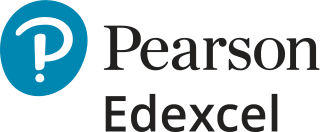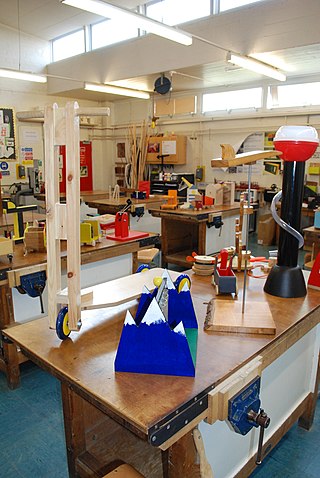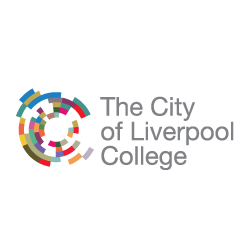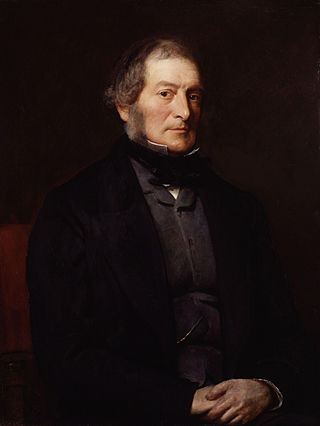Related Research Articles

The General Certificate of Secondary Education (GCSE) is an academic qualification in a range of particular subjects, taken in England, Wales, and Northern Ireland. State schools in Scotland use the Scottish Qualifications Certificate instead. Private schools in Scotland may choose to use GCSEs from England.

A graphing calculator is a handheld computer that is capable of plotting graphs, solving simultaneous equations, and performing other tasks with variables. Most popular graphing calculators are programmable calculators, allowing the user to create customized programs, typically for scientific, engineering or education applications. They have large screens that display several lines of text and calculations.
Coursework is work performed by students or trainees for the purpose of learning. Coursework may be specified and assigned by teachers, or by learning guides in self-taught courses. Coursework can encompass a wide range of activities, including practice, experimentation, research, and writing. In the case of students at universities, high schools and middle schools, coursework is often graded and the scores are combined with those of separately assessed exams to determine overall course scores. In contrast to exams, students may be allotted several days or weeks to complete coursework, and are often allowed to use text books, notes, and the Internet for research.
In the Scottish secondary education system, the Higher is one of the national school-leaving certificate exams and university entrance qualifications of the Scottish Qualifications Certificate (SQC) offered by the Scottish Qualifications Authority. It superseded the old Higher Grade on the Scottish Certificate of Education (SCE). Both are normally referred to simply as "Highers".

AQA Education, trading as AQA, is an awarding body in England, Wales and Northern Ireland. It compiles specifications and holds examinations in various subjects at GCSE, AS and A Level and offers vocational qualifications. AQA is a registered charity and independent of the government. However, its qualifications and exam syllabi are regulated by the Government of the United Kingdom, which is the regulator for the public examinations system in England and Wales.

Edexcel is a British multinational education and examination body formed in 1996 and wholly owned by Pearson plc since 2005. It is the only privately owned examination board in the United Kingdom. Its name is a portmanteau term combining the words education and excellence.

The International General Certificate of Secondary Education (IGCSE) is an English language based secondary qualification similar to the GCSE and is recognised in the United Kingdom as being equivalent to the GCSE for the purposes of recognising prior attainment. It was developed by Cambridge Assessment International Education. The examination boards Edexcel, Learning Resource Network (LRN), and Oxford AQA also offer their own versions of International GCSEs. Students normally begin studying the syllabus at the beginning of Year 10 and take the test at the end of Year 11. However, in some international schools, students can begin studying the syllabus at the beginning of Year 9 and take the test at the end of Year 10.
The Certificate of Secondary Education (CSE) was a subject-specific qualification family awarded in both academic and vocational fields in England, Wales and Northern Ireland. CSE examinations were held in the years 1965 to 1987. This qualification should not be confused with the Indian Certificate of Secondary Education which is a school-leaving qualification in India. Also, in some African and former British colonial countries there is a qualification named the Certificate of Secondary Education based on the original and former British variant. Also, the CSE should not be confused with the African qualification CSEE.

Design and Technology is a school subject offered at all levels of primary and secondary school in the United Kingdom. It is used so children develop a range of designing skills and technology skills for example, using media to design their project. It first appeared as a titled subject in the first National Curriculum of England, Wales and Northern Ireland in 1988.
The Group 3: Individuals and societies subjects of the IB Diploma Programme consist of ten courses offered at both the Standard level (SL) and Higher level (HL): Business Management, Economics, Geography, Global Politics, History, Information technology in a global society (ITGS), Philosophy, Psychology, Social and cultural anthropology, and World religions. There is also a transdisciplinary course, Environmental systems and societies, that satisfies Diploma requirements for Groups 3 and 4.
Physics education or physics teaching refers to the education methods currently used to teach physics. The occupation is called physics educator or physics teacher. Physics education research refers to an area of pedagogical research that seeks to improve those methods. Historically, physics has been taught at the high school and college level primarily by the lecture method together with laboratory exercises aimed at verifying concepts taught in the lectures. These concepts are better understood when lectures are accompanied with demonstration, hand-on experiments, and questions that require students to ponder what will happen in an experiment and why. Students who participate in active learning for example with hands-on experiments learn through self-discovery. By trial and error they learn to change their preconceptions about phenomena in physics and discover the underlying concepts. Physics education is part of the broader area of science education.
The Singapore-Cambridge General Certificate of Education Ordinary Level is a GCE Ordinary Level examination held annually in Singapore and is jointly conducted by the Ministry of Education (MOE), Singapore Examinations and Assessment Board (SEAB) and the University of Cambridge Local Examinations Syndicate (UCLES). Students are graded in the bands ranging from A to F and each band has a respective grade point, the lower grade point means better performance eg A1 band equates to 1 grade point, A1=1, A2=2, B1=3, B2=4, C1=5, C2=6, D=7, E=8, F=9. To pass the O-level, the student must score minimum C2 band or above, highest a student can achieve is A1 grade band.

The City of Liverpool College is one of three colleges of further education in Liverpool, Merseyside. It was established in 1992 by the amalgamation of all four further education colleges within Liverpool.

The A-level is a subject-based qualification conferred as part of the General Certificate of Education, as well as a school leaving qualification offered by the educational bodies in the United Kingdom and the educational authorities of British Crown dependencies to students completing secondary or pre-university education. They were introduced in England and Wales in 1951 to replace the Higher School Certificate. The A-level permits students to have potential access to university if their grade is of satisfactory quality.
The "School Level Certificate" popularly abbreviated as SLC, is the final examination of Class 11 and Class 12 which is also known as +2 course in Nepal. +2 is generally pursued after completing SEE examination .+2 Course is equivalent to GCE also known as school leaving qualification and SEE is equivalent to GCSE, the academic qualifications in England.
The General Certificate of Education (GCE) Advanced Level, or A Level, is a main school leaving qualification in England, Wales, Northern Ireland, the Channel Islands and the Isle of Man. It is available as an alternative qualification in other countries.
Additional Mathematics is a qualification in mathematics, commonly taken by students in high-school. It features a range of problems set out in a different format and wider content to the standard Mathematics at the same level.
Project Lead The Way (PLTW) is an American nonprofit organization that develops STEM curriculum for use by US elementary, middle, and high schools.
AP Capstone is a 2-year program developed by the College Board, which consists of two courses: the AP Seminar and AP Research. Students who successfully complete the program and obtain scores of 3 or higher on at least four other AP exams receive either an AP Capstone Diploma or an AP Seminar and Research Certificate.

Science education in England is generally regulated at all levels for assessments that are England's, from 'primary' to 'tertiary' (university). Below university level, science education is the responsibility of three bodies: the Department for Education, Ofqual and the QAA, but at university level, science education is regulated by various professional bodies, and the Bologna Process via the QAA. The QAA also regulates science education for some qualifications that are not university degrees via various qualification boards, but not content for GCSEs, and GCE AS and A levels. Ofqual on the other hand regulates science education for GCSEs and AS/A levels, as well as all other qualifications, except those covered by the QAA, also via qualification boards.